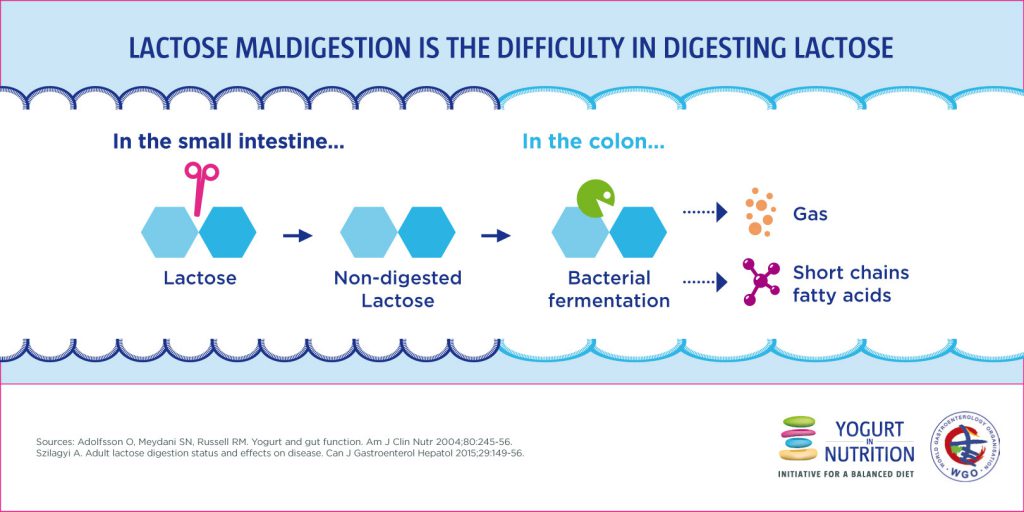When it comes to digestion, yogurt stands out as an asset not to be overlooked in daily life. As a dairy product, yogurt is a source of lactose but also contains live bacteria that produce lactase, which improves the digestion of the lactose contained. Moreover, evidence shows that yogurt consumption has beneficial outcomes in terms of gut health and may help people that suffer constipation episodes.
Yogurt is beneficial for people with lactose maldigestion
Lactose is a natural sugar found in milk and other dairy products. When digesting, it can be broken down by the enzyme lactase in the small intestine into two simpler sugars, glucose and galactose, that are absorbed into the bloodstream.
When undigested lactose molecules reach the colon, they are fermented by the resident microbiota, resulting in the production of short-chain fatty acids (SCFAs) and gases: this is called lactose maldigestion. In most people, lactose maldigestion produces no noticeable symptoms. However, when it gives rise to symptoms such as bloating, cramps, diarrhea and flatulence, we talk about lactose intolerance (1).

Dairy products are recognized as an important part of a healthy diet as they are a source of several nutrients, such as calcium, for which it is difficult to achieve the recommended daily intake from a dairy-free diet (2,11). It is therefore important that dairy products are part of the diet of people with lactose maldigestion or intolerance. It is therefore important that dairy products are part of the diet of people with lactose maldigestion or intolerance.
People suffering lactose maldigestion can consume standard yogurt: it only contains a reduced level of lactose (2). This is due the live bacteria producing the lactase that are used in the fermentation process (L. delbrueckii subsp. bulgaricus and S. thermophilus). The enzyme hydrolyses the lactose. Furthermore, some of the active bacteria survive their passage through the gut: as a result, the bacterial lactase helps further with digestion of lactose in the small intestine, partly solving the problem of lactose fermentation that causes maldigestion or intolerance
The European Food Safety Authority (EFSA) issued in 2010 an official scientific opinion (3) that claims the consumption of live cultures in yogurt, Lactobacillus delbrueckii subsp, bulgaricus and Streptococcus thermophilus, improves digestion of lactose for individuals with lactose maldigestion.
Yogurt with live microorganisms can contribute to gut health
The gut microbiota plays an important role in digestion, but is also of paramount importance for the normal development of the immune system and nerve function (4). Gut microbiota composition can be influenced by our diet (5) and beneficially when fermented foods, such as yogurt, are consumed.
In fact, a small portion of bacteria contained in the dairy matrix surviving in the digestive tract (6), these strains will bolster the resident microbiota, up to 10,000 times (7) and add new beneficial bacteria strains, which diversify the populations. Such a supplementation coming from the diet is beneficial for maintenance of gut health, an enhanced intestinal microbiota, and could improve digestive pathologies or discomfort. Also, this fermented product intake has positive for the immune system development and cognitive functions.
Yogurt may help with constipation
Constipation is very common in children and adults and can become chronic. Chronic constipation can be defined as including fewer than 3 stools per week, stool form that is mostly hard or lumpy and difficult stool passage more than 6 months. Chronic constipation accounts for (in average) for 2 to 27% of adult population (8).
Some results have shown that the consumption of standard yoghurt (milk fermented by the two bacterial strains L. bulgaricus and S. thermophiles) reduced intestinal transit time in adults with habitual constipation. In the same study, subjects consuming fermented milk also had improved bowel function (9).
According to the authors of a clinical trial (10), the alleviation of the constipation symptoms could be due to the therapeutic potential of probiotics contained in yogurt. The intake of probiotic yogurt accelerated bowel transit in germ-free animals in the trial and globally, evidence showed an improvement in constipation symptoms using both supplemented in probiotic strains and non-supplemented yogurts (11).
Only few reports and studies on this subject are available for the moment, and more research is needed to deeply understand the beneficial actions of probiotics on gut malfunctions such as constipation, especially in chronically constipated subjects.
Related posts:
- Our special focus : Fermented foods
- Our special focus: Lactose intolerance
- Q&A: What is gut microbiota?
- Could eating yogurt help protect you from bowel cancer?



